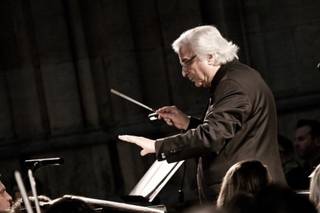 April 14, 2015
April 14, 2015
CONCERT REVIEW: CANTERBURY CHORAL SOCIETY PERFORMS HIGHLY CHARGED FINALE IN OKLAHOMA CITY
By RICK ROGERSKnowledgeable listeners can easily distinguish grand symphonies from intimate chamber works, or reverential masses from imposing operas. But cast a popular masterpiece in a different guise, and its familiar traits suddenly strike the listener in unexpected ways.
Canterbury Choral Society proved that notion in dramatic fashion with its season finale, a highly charged and emotional performance of the “Defiant Requiem: Verdi at Terezin.”
The audience still heard Verdi’s magnum opus, but once they learned about the events that inspired this performance, the work took on greater resonance and power. It’s something akin to a brilliant soloist making us think we’re hearing a work anew.
The “Defiant Requiem” was inspired by events that unfolded during World War II at Terezin, a Czech concentration camp. Conductor Rafael Schachter taught a group of 150 fellow prisoners the Verdi “Requiem.”
Given its lengthy running time and untold musical complexities, that would have been a monumental undertaking, made all the more challenging when one considers that its singers had to learn the work by rote.
A frequent sentiment emerged in filmed remembrances by chorus survivors: “We will sing to them what we cannot say to them.” It proved to be an amazing act of defiance against the Nazis.
After stumbling across a book titled “Music at Terezin” in 1994, conductor Murry Sidlin created the “Defiant Requiem,” a work he has since conducted three dozen times in performances around the globe.
The latest, a collaboration with the Jewish Federation of Greater Oklahoma City that featured Canterbury, Oklahoma City University’s Chamber Choir and University Singers, four soloists and the Oklahoma City Philharmonic, could not have been more impressive.
Sidlin clearly conveyed his enthusiasm for the work to the assembled forces, all of whom communicated that commitment to the near-capacity crowd. The enormity of his task was lessened thanks to Randi Von Ellefson’s fine preparation of the choral forces.
One could cite numerous highlights in this concert, from the “Dies Irae” (Day of Wrath) that stormed the heavens, to the lilting “Offertorio” that featured the capable soloists Regina Grimaldi, Catherine McDaniel, Steven Tharp (a standout) and Mark McCrory.
There was also the chorus nimbly negotiating the challenges of the highly rhythmic “Sanctus,” the ethereal sounding “Lux Aeterna,” the telling recitations by D. Lance Marsh and Brenda Holleman, and the bold orchestral statements that punctuated the final “Requiem Aeternam.”
But it was the cumulative effect of those moments, from the introspective to the rafter-shattering, that resonated most powerfully. And while the definition of “Requiem” is a memorial for the dead, this was a performance that could only be considered life-affirming.


